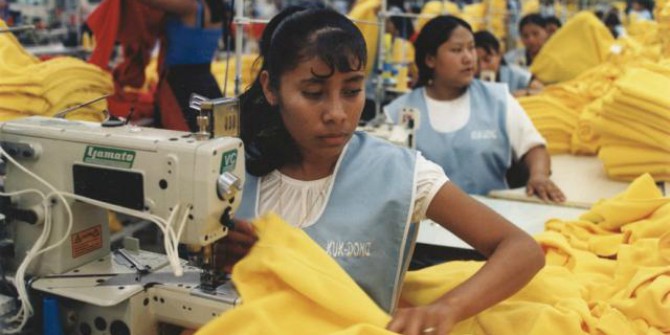As the UK government pivots towards artificial intelligence as industrial strategy, we must reflect on the purpose of work and the place of technology in the transition. The assumption that accelerated innovation will by default lead to a more skilled workforce is contestable. Abigail Gilbert writes that the government should initiate a Work 5.0 Strategy and bring forward robust proposals for the governance of AI systems, in an effort to value and reward human service work more highly.
A high-skill, high-wage economy is a desirable future in the eyes of many. It is perhaps no wonder, then, that Prime Minister Boris Johnson focused his party conference speech a few days ago on such an outcome and cited tech as at the heart of this transition.
Yet, in recent weeks a crisis in supply of heavy goods vehicle (HGV) drivers and, before that, agricultural workers, defined media attention—roles widely perceived as ‘low-skill’ and low-wage work. While driving jobs are subject to much ‘hype’ about imminent automation, many consider farm work to have long since been mechanised – didn’t we do that in the first industrial revolution?
Newfound labour shortages reveal (just as essential work did through the pandemic) that humans are still the backbone of our economy, and it’s often the least paid people the ones we can’t go on without. Labour shortage concerns since Brexit have been in exactly those industries (care, hospitality) deemed to be future growth sectors for the future of work, as work in these sectors here remains resistant to automation. Thus, we should perhaps focus most on how this work is valued in our economy.
Some advocates of Brexit—following the orthodoxy of supply and demand as prime mediator of value—argued that labour shortages would serve to increase wages for these workers. Putting aside that the argument that EU labour supply led wage suppression has been contested (and that this approach carries risks of cost-push inflation), this reasoning underestimates the variety of factors that mediate the way value is estimated and attributed in our economy.
One such factor is technology policy. As the government pivots towards artificial intelligence (AI) as industrial strategy, we must reflect on the purpose of work, and the place of technology in the transition. As technology is introduced, it changes the structure of labour markets in ways that create prosperity, but can also devalue work and make society more unequal.
Leading AI companies awarded ‘superstar’ economic status often employ a handful of ‘high-skill’ AI experts with low in-house staff numbers, appearing as productivity outliers. However, these same firms rely for their daily operations on low-wage work of contested quality. This work, as with lorry drivers and agricultural workers, is often done by migrants, or, as conceived by one theory, labour market ‘outsiders’ who are both disadvantaged and more at risk of exploitation.
As our own work at the Institute for the Future of Work (IFOW) has shown, these ‘superstar’ business models are increasingly mirrored in conventional businesses. An increasing number of firms adopted platform business logics through the pandemic, in ways that see skill consciously stripped from work, to strategically devalue labour and reduce its bargaining power. This drives labour market polarisation. As one workplace AI software developer told us about this tool:
‘The need to be an advanced engineer can be significantly reduced… you can lower the barriers to entry. The benefits of digital work instructions are you don’t need to be an expert’
And another suggested:
‘For your average worker, yep, you could be replaced by a gig worker – you could lose all predictability in your earnings and be replaced by someone with less experience.’
With this in mind, the assumption that accelerated innovation will by default lead to a more skilled workforce is contestable. It can lead to the deskilling of work and support the devaluation of labour. Addressing the impacts of automation on the valuation of labour while adopting new technology requires a granular, more sensitive appreciation of the relationship between AI, data, and workplace transformation. How technology changes labour markets is subject to our collective agreement, and that is shaped by policy and design.
This requires policymakers and businesses to recognise their responsibility in valuing and rewarding human ‘service’ work more highly and to develop a regulatory environment that attributes accountability for the social, psychological and economic impacts of AI on work—not least, impacts on equality.
The government should initiate a Work 5.0 Strategy, as the Department for Work and Pensions Committee and IFOW have proposed, to coordinate and focus a cross-departmental response aimed at creating good work across the economy; and should in parallel bring forward robust proposals for the governance of AI systems. Such holistic, forward-looking approaches are surely key, if the economy is going to work for all of us.
♣♣♣
Notes:
- This blog post is based on The Amazonian Era: How algorithmic systems are eroding good work, Institute for the Future of Work.
- The represents the views of the author(s), not the position of LSE Business Review or the London School of Economics.
- Featured image by Crystal Kwok on Unsplash
- When you leave a comment, you’re agreeing to our Comment Policy.





